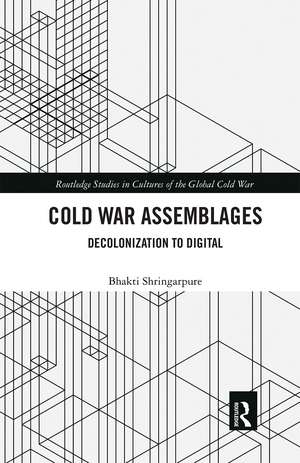Cold War Assemblages: Decolonization to Digital: Routledge Studies in Cultures of the Global Cold War
Autor Bhakti Shringarpureen Limba Engleză Paperback – 18 dec 2020
| Toate formatele și edițiile | Preț | Express |
|---|---|---|
| Paperback (1) | 383.83 lei 6-8 săpt. | |
| Taylor & Francis – 18 dec 2020 | 383.83 lei 6-8 săpt. | |
| Hardback (1) | 999.46 lei 6-8 săpt. | |
| Taylor & Francis – 3 apr 2019 | 999.46 lei 6-8 săpt. |
Preț: 383.83 lei
Nou
Puncte Express: 576
Preț estimativ în valută:
73.46€ • 75.88$ • 61.13£
73.46€ • 75.88$ • 61.13£
Carte tipărită la comandă
Livrare economică 26 martie-09 aprilie
Preluare comenzi: 021 569.72.76
Specificații
ISBN-13: 9780367670900
ISBN-10: 0367670909
Pagini: 218
Dimensiuni: 152 x 229 x 20 mm
Greutate: 0.32 kg
Ediția:1
Editura: Taylor & Francis
Colecția Routledge
Seria Routledge Studies in Cultures of the Global Cold War
Locul publicării:Oxford, United Kingdom
ISBN-10: 0367670909
Pagini: 218
Dimensiuni: 152 x 229 x 20 mm
Greutate: 0.32 kg
Ediția:1
Editura: Taylor & Francis
Colecția Routledge
Seria Routledge Studies in Cultures of the Global Cold War
Locul publicării:Oxford, United Kingdom
Public țintă
Postgraduate and UndergraduateCuprins
Introduction: Cold War Assemblages 1. Epistemic Bifurcations: Fanon, Gandhi, and the Failure of Theory 2. Dying Before Their Time: Lumumba, Cabral, and Sankara 3. Cold War Disciplinarity: Postcolonial Studies and Its Discontents 4. The Cold War Paradigm: A Trajectory of Literary Canons. Epilogue: The Postcolony Is a Cold War Ruin
Notă biografică
Bhakti Shringarpure is Assistant Professor of English at the University of Connecticut and editor-in-chief of Warscapes magazine.
Recenzii
"Bhakti Shringarpure's book is a necessary intervention in the intellectual history of the Cold War and the postcolony. In showing that these histories cannot be separated, Shringarpure also shows how both are 'embedded in futures to come.' Anyone interested in political violence, revolutionary time, radicalism and political theory must reckon with Shringarpure's analysis."
— Sean Jacobs, The New School and "Africa is a Country"
"Shringarpure goes beneath the skin of postcolonialism and finds the Cold War. Here is the brutality of colonial violence - the harsh use of the stick, surely, but also the enforcement of starvation. Her book slips through the minds of major thinkers of decolonization, finding so much about them that has been set aside by the narrower concerns of North Atlantic postcolonial studies. This is criticism with a foot deeply sunk into the mud of the South."
— Vijay Prashad, Tricontinental: Institute for Social Research
"This is an important rethinking of postcolonial studies today. Shringarpure’s provocative book underscores the urgency of bringing together studies of colonialism with studies of the Cold War, and offers a compelling methodology for doing this work. Clearly written and bold, Cold War Assemblages questions widely-touted figures and approaches from Gandhi to close reading and 'openness' in the digital realm, and offers in the place of depoliticized reading and teaching strategies a 'red thread' that ties together the US-American university landscape and culture industry with the historical and on-going impacts of colonialism and Cold War violence in the Global South."
— Kerry Bystrom, Associate Professor of English and Human Rights and Associate Dean of the College at Bard College Berlin, A Liberal Arts University
— Sean Jacobs, The New School and "Africa is a Country"
"Shringarpure goes beneath the skin of postcolonialism and finds the Cold War. Here is the brutality of colonial violence - the harsh use of the stick, surely, but also the enforcement of starvation. Her book slips through the minds of major thinkers of decolonization, finding so much about them that has been set aside by the narrower concerns of North Atlantic postcolonial studies. This is criticism with a foot deeply sunk into the mud of the South."
— Vijay Prashad, Tricontinental: Institute for Social Research
"This is an important rethinking of postcolonial studies today. Shringarpure’s provocative book underscores the urgency of bringing together studies of colonialism with studies of the Cold War, and offers a compelling methodology for doing this work. Clearly written and bold, Cold War Assemblages questions widely-touted figures and approaches from Gandhi to close reading and 'openness' in the digital realm, and offers in the place of depoliticized reading and teaching strategies a 'red thread' that ties together the US-American university landscape and culture industry with the historical and on-going impacts of colonialism and Cold War violence in the Global South."
— Kerry Bystrom, Associate Professor of English and Human Rights and Associate Dean of the College at Bard College Berlin, A Liberal Arts University
Descriere
This book bridges the gap between the parallel histories of postcoloniality and the 45-year rivalry between the U.S. and the U.S.S.R. The superpowers relied upon the decolonizing world to further imperial agendas, and the postcolony in turn was shaped by Cold War discourses and paradigms.



